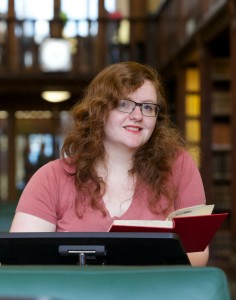 Rhiannon Easterbrook is a second-year PhD candidate in the Department of Classics and Ancient History. Having gained degrees from Cambridge and UCL, she took a few years out to work but is delighted to be back in academia. Her work is on classical reception in performance and performativity in Britain, 1895-1914. She is interested in how the Edwardians used ideas from the ancient world to think about embodiment, gender, and sexuality.
Rhiannon Easterbrook is a second-year PhD candidate in the Department of Classics and Ancient History. Having gained degrees from Cambridge and UCL, she took a few years out to work but is delighted to be back in academia. Her work is on classical reception in performance and performativity in Britain, 1895-1914. She is interested in how the Edwardians used ideas from the ancient world to think about embodiment, gender, and sexuality.
When, in my first meeting, my supervisor asked me if I was familiar with the psychology of long-distance running, I was apprehensive. When he followed this up with a warning that I will “face [my] demons” as part of my research, I really began to wonder what I was letting myself in for.
I have never liked running and am not particularly into demons – my own or other people’s. I began to worry that I had set myself up for the sequel of Marathon Man. Trying not to clutch my mouth in self-defence, I waited for whatever grim surprises lay ahead.
Looking back, my supervisor had a point, however. Although I haven’t exactly been tormented by nightly apparitions of my deepest, darkest self, I have had to keep an eye on my mind-set and this has been more obvious to me now than at any other point since I started. You see, two months ago I completed my upgrade.
For those of you who don’t know, an upgrade is where you go from being a lowly MLitt student to the, err, heights of doctoral candidate. In order to make the change you have to demonstrate through a written submission and viva that you have made sufficient progress in your research and that you have project which is worthwhile and able to be completed on time. Hours of toil went into producing an 11,000-word sample of my first chapter, a detailed thesis plan, and a schedule of work. Bearing in mind that prior to this degree, I had never studied the Edwardian period or used an archive and that, while my MA thesis had been in the same field, was on something completely different, you can imagine that it took me quite a lot of work to get to this point. And that’s on top of settling into a new city and earning my keep. Suffice to say, an upgrade can be a pretty stressful way to end your first year!
After all that work is the assessment with two internal examiners. There were some good moments, such as the time I almost got an impression that they might have enjoyed reading the thing. There were some not-so-good moments (oddly enough, those tangential paragraphs I tried to sneak in did actually get noticed by two people with years of experience in academic writing). There was one bit that was just plain embarrassing (not sure how I managed to start talking about the Singing Bush in The Three Amigos but it was something about slaves being treated as part of the flora and fauna). Overall, it was tough and I came out feeling bruised but positive, tired but hopeful.
However, as helpful as the process is (or should be) in getting you to evaluate your project, the period afterwards is, in many ways, even more difficult than the weeks before submission. The first year is dominated by this looming deadline but, once that passes, all that is left is handing in the full thesis, an event which is at least two years down the line. Now that the pressure is off, self-discipline and focus become even more important in the intellectual marathon my supervisor warned me about. In addition, being forced by my assessors to reappraise my work – despite knowing that it needed reappraisal – is still a blow to the ego. PhD research becomes a part of your identity and no one likes having their identity challenged. Having repeatedly chewed over the upgrade problem with friends who are ahead of me, I knew this would happen but there’s a difference between seeing a route and running it.
So, how am I doing? Well, it could be better. Like many a self-funded arts PhD, I work to support myself and there are times when my various side-jobs and duties threaten to take me on a detour. I also occasionally like to pretend I have a social life. Yet, I still seem to be researching. I look out for the landmarks on my way – the conferences I’m contributing to, the mutual support from my comrades-in-research, those small but significant breakthroughs in my thinking – and most of all, I keep putting one foot in front of the other.

